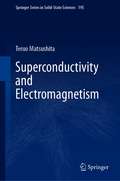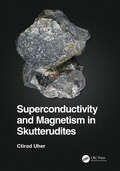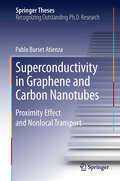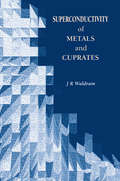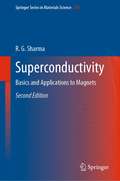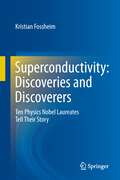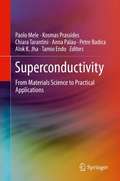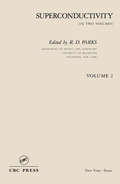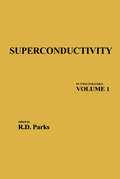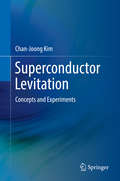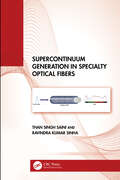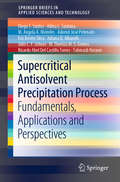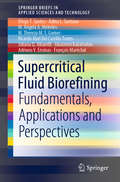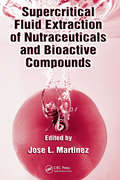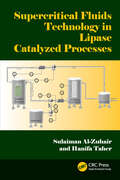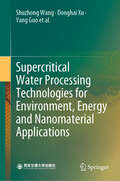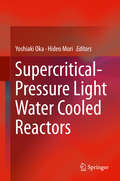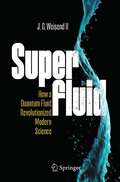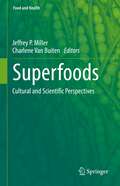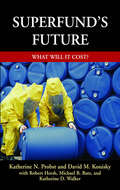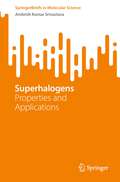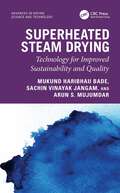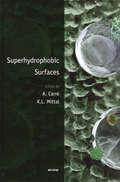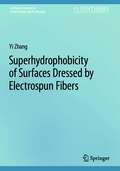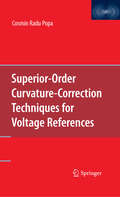- Table View
- List View
Superconductivity and Electromagnetism (Springer Series in Solid-State Sciences #195)
by Teruo MatsushitaThis book introduces readers to the characteristic features of electromagnetic phenomena in superconductivity. It first demonstrates not only that the diamagnetism in the superconductivity complies with Maxwell’s theory, which was formulated before the discovery of superconductivity, but also that the dominant E-B analogy in the electromagnetism loses perfection without the superconductivity. The book then explores flux pinning, which is responsible for the non-dissipative current in DC, leading to irreversibility in AC. Drawing on Maxwell’s work, it also proves theoretically that if there is no energy dissipation in the superconductivity caused by the break in time reversal symmetry, it contradicts the thermodynamic principle of energy conservation – something that had previously only been proved experimentally.Lastly, the book addresses the longitudinal magnetic field effect, and explains how this phenomenon leads to a new development of Maxwell’s theory. Featuring numerous appendices to help readers understand the methods of derivation of equations, this book offers students and young scientists an introduction to applied superconductivity, especially in the context of power applications. Presenting the characteristic features of electromagnetic phenomena in superconductivity from basic to advanced topics for applications, the book offers a valuable resource for graduate students and researchers studying superconductivity as well as engineers working in electric utility industry.
Superconductivity and Magnetism in Skutterudites
by Ctirad UherSuperconductivity and Magnetism in Skutterudites discusses superconducting and magnetic properties of a class of materials called skutterudites. With a brief introduction of the fundamental structural features of skutterudites, the book then provides a detailed assessment of the superconducting and magnetic properties, focusing particularly on the rare earth-filled skutterudites where a plethora of fascinating properties and ground states is realized due to interactions of the filler species with the framework ions. Such interactions underpin the exciting forms of superconductivity and magnetism, most notably realized in the exotic heavy fermion superconductor of composition PrOs4Sb12. The two main topics of superconductivity and magnetism are provided with a concise introduction of superconducting and magnetic properties so that a reader can appreciate and understand the main arguments in the text. This book would appeal to graduate students, postdoctoral students, and anyone interested in superconducting and magnetic properties of a large family of minerals called skutterudites. Key Features:• Gives a thorough account of the superconducting and magnetic properties of skutterudites. • Each topic is accompanied by introductory sections to assist in the understanding of the text. • Supported by numerous figures and all key references.
Superconductivity in Graphene and Carbon Nanotubes
by Pablo Burset AtienzaThe unique electronic band structure of graphene gives rise to remarkable properties when in contact with a superconducting electrode. In this thesis two main aspects of these junctions are analyzed: the induced superconducting proximity effect and the non-local transport properties in multi-terminal devices. For this purpose specific models are developed and studied using Green function techniques, which allow us to take into account the detailed microscopic structure of the graphene-superconductor interface. It is shown that these junctions are characterized by the appearance of bound states at subgap energies which are localized at the interface region. Furthermore it is shown that graphene-supercondutor-graphene junctions can be used to favor the splitting of Cooper pairs for the generation of non-locally entangled electron pairs. Finally, using similar techniques the thesis analyzes the transport properties of carbon nanotube devices coupled with superconducting electrodes and in graphene superlattices.
Superconductivity of Metals and Cuprates
by J.R WaldramSuperconductivity of Metals and Cuprates covers the basic physics of superconductivity, both the theoretical and experimental aspects. The book concentrates on important facts and ideas, including Ginzburg-Landau equations, boundary energy, Green's function methods, and spectroscopy. Avoiding lengthy or difficult presentations of theory, it is written in a clear and lucid style with many useful, informative diagrams. The book is designed to be accessible to senior undergraduate students, making it a helpful tool for teaching superconductivity as well as serving as an introduction to those entering the field.
Superconductivity: Basics and Applications to Magnets (Springer Series in Materials Science #214)
by R.G. SharmaThis book presents the basics of superconductivity and applications of superconducting magnets. It explains the phenomenon of superconductivity, describes theories of superconductivity, and discusses type II and high-temperature cuprate superconductors. The main focus of the book is the application of superconducting magnets in accelerators, fusion reactors and other advanced applications such as nuclear magnetic resonance (NMR), magnetic resonance imaging (MRI), high-gradient magnetic separation (HGMS), and superconducting magnetic energy storage (SMES). This new and significantly extended second edition covers the state of the art in the development of novel superconductors for advanced magnet applications, as well as the production of practical superconducting wires, tapes, and ultra high current cables used for high-field magnets. It includes two new chapters each devoted to MgB2 and Fe-based superconductors, and discusses the recently developed and world record-setting 45.5-Tesla magnetic field generated by a combination of conventional and high-temperature cuprate superconducting magnets. In addition, it discusses the status and outlook of all current and future nuclear fusion reactors worldwide. The chapter on accelerators includes the ongoing efforts to build high luminosity LHC (HL-LHC), the high-energy 28 TeV LHC (HE-LHC), the future circular collider (FCC) at CERN, and the just launched electro-ion collider (EIC) at Brookhaven National Laboratory. The book is based on the long-standing experience of the author in studying superconducting materials, building magnets and delivering numerous lectures to research scholars and students. The book provides comprehensive and fundamental knowledge in the field of applied superconductivity, greatly benefiting researchers and graduate students wishing to learn more about the various aspects of superconductivity and advanced magnet applications.
Superconductivity: Discoveries and Discoverers
by Kristian FossheimThis book is about the work of 10 great scientists; who they were and are, their personal background and how they achieved their outstanding results and took their prominent place in science history. We follow one of physics and science history's most enigmatic phenomena, superconductivity, through 100 years, from its discovery in 1911 to the present, not as a history book in the usual sense, but through close ups of the leading characters and their role in that story, the Nobel laureates, who were still among us in the years 2001-2004 when the main round of interviews was carried out. Since then two of them already passed away. For each one of the 10 laureates, the author tells their story by direct quotation from interviews in their own words. Each chapter treats one laureate. The author first gives a brief account of the laureates' scientific background and main contribution. Then each laureate tells his own story in his own words. This book is unique in its approach to science history.
Superconductivity: From Materials Science to Practical Applications
by Paolo Mele Tamio Endo Anna Palau Kosmas Prassides Chiara Tarantini Petre Badica Alok K. JhaThis book provides readers with a comprehensive overview of the science of superconducting materials. It serves as a fundamental information source on the actual techniques and methodologies involved in superconducting materials growth, characterization and processing. This book includes coverage of several categories of medium and high-temperature superconducting materials: cuprate oxides, borides, and iron-based chalcogenides and pnictides. Provides a single-source reference on superconducting materials growth, characterization and processing;Bridges the gap between materials science and applications of superconductors;Discusses several categories of superconducting materials such as cuprate oxides, borides, and iron-based chalcogenides and pnictides;Covers synthesis, characterization, and processing of superconducting materials, as well as the nanoengineering approach to tailor the properties of the used materials at the nanoscale level.
Superconductivity: In Two Parts: Volume 2
by R.D. ParksFirst published in 1969. CRC Press is an imprint of Taylor & Francis.
Superconductivity: In Two Volumes: Volume 1
by R. D. ParksThis volume is an integrated work with a full exposition of the Bardeen-Cooper-Schrieffer theory, the Ginzburg-Landau theory, and the Gor’kov treatment of superconductivity. It discusses the fundamental experiments on macroscopic quantum phenomena and the Josephson effect.
Superconductor Levitation: Concepts and Experiments
by Chan-Joong KimThis book introduces the physical principles behind levitation with superconductors, and includes many examples of practical magnetic levitation demonstrations using superconducting phenomena. It features more than twenty examples of magnetic levitation in liquid nitrogen using high temperature superconductors and permanent magnets, all invented by the author. The book includes the demonstration of suspension phenomenon induced by magnetic flux pinning as well as magnetic levitation by the Meissner effect. It shows how superconducting magnetic levitation and suspension phenomena fire the imagination and provide scientific insight and inspiration. This book will be a useful experimental guide and teaching resource for those working on superconductivity, and a fascinating text for undergraduate and graduate students.
Supercontinuum Generation in Specialty Optical Fibers
by Ravindra Kumar Sinha Than Singh SainiThis book focuses on the basic understanding of specialty optical fibers, their applications in mid-IR light generation, and cutting-edge research in the field. The book provides all the basic knowledge about specialty optical fibers and their characteristics, including dispersion, losses, propagation of modes, and so forth. Finally, the technologies based on optical fibers and their applications in all prospective areas of research are discussed.Features: Provides an introduction to the history of the specialty optical fibers, and technologies based on specialty optical fibers Explores specific applications of mid-IR supercontinuum generation in specialty optical fibers Discusses the fabrication of specialty optical fiber-based photonic devices Reviews the integration of nanotechnology with specialty optical fibers Details future prospectives of specialty optical fiber-based photonic devices This book is aimed at graduate students and researchers in photonics, optics, physics, and photonic crystal fibers.
Supercritical Antisolvent Precipitation Process: Fundamentals, Applications and Perspectives (SpringerBriefs in Applied Sciences and Technology)
by Diego T. Santos Ádina L. Santana M. Angela Meireles Ademir José Petenate Eric Keven Silva Juliana Q. Albarelli Júlio C. Johner M.Thereza M. S. Gomes Ricardo Abel Torres Tahmasb HatamiThis book provides deep insights on the fundamentals, applications and perspectives of the Supercritical AntiSolvent (SAS) Precipitation Process. Chapter 1 provides recent (2013-2018) reports on the use of supercritical CO2 (SC-CO2) antisolvent for micronization, coprecipitation and fractionation of high-value products for the food, cosmetic and pharmaceutical industries. Chapter 2 discusses another variant of the SAS precipitation process called Supercritical fluid extraction of emulsions (SFEE). This chapter provides recent data from 2016-2018 reports investigation of supercritical extraction of emulsions (SFEE) to encapsulate compounds of great interest to the food and non-food industry. Chapter 3 details the design and construction of a SAS Precipitation equipment. Chapter 4 presents experimental results regarding the validation of the supercritical particle formation equipment. Chapter 5 shows the effects of process parameters during particle precipitation using Combined High Turbulence Extraction Assisted by Ultrasound and Supercritical Antisolvent Fractionation (SAF) processes applied to semi-defatted annatto seeds, as a model raw material plant, were investigated. Chapter 6 shows experimental results regarding the process Ultrasound Emulsification Assisted by Nitrogen Hydrostatic Pressure (UEANHP), during the emulsification preparation step of the Supercritical Fluid Extraction of Emulsions (SFEE) process, one of the options of the SAS Precipitation-based process. Finally, Chaptesr 7 and 8 present some perspectives about the economics and process integration with other processes aiming the development of novel conceptual biorefinering approaches for plant materials valorization.
Supercritical Fluid Biorefining: Fundamentals, Applications and Perspectives (SpringerBriefs in Applied Sciences and Technology)
by Diego T. Santos Ádina L. Santana M. Angela Meireles Juliana Q. Albarelli Ricardo Abel Torres M. Thereza Gomes Aikaterini Bakatselou Adriano V. Ensinas François MaréchalThis book provides deep insights about the fundamentals, applications and perspectives of the use of supercritical CO2 as solvent and antisolvent for biorefinering.
Supercritical Fluid Extraction of Nutraceuticals and Bioactive Compounds
by Jose L. MartínezEnhanced concern for the quality and safety of food products, increased preference for natural products, and stricter regulations on the residual level of solvents, all contribute to the growing use of supercritical fluid technology as a primary alternative for the extraction, fractionation, and isolation of active ingredients. As a solvent-free p
Supercritical Fluids Technology in Lipase Catalyzed Processes
by Sulaiman Al-Zuhair Hanifa TaherEnzymes are currently used in various industries, most commonly in food, detergents, and pharmaceuticals production. Lipases are hydrolytic enzymes that demonstrate great potential as an alternative to conventional catalysts in a number of industrial applications. A complete understanding of enzymes, and their proteins structure and environmental behavior, can greatly aid in the further development of industrial applications. Supercritical Fluids Technology in Lipase Catalized Processes provides basic information about enzymes, their sources, reaction kinetics, and main industrial applications. The book focuses in lipases. their main sources, structure, and features, with an emphasis on their specificity and interfacial activity, and presents proven techniques for isolating, extracting, and purifying. Comprised of six compact chapters, this comprehensive guide introduces: Immobilization techniques and immobilized lipases that allow repeated use (which is essential from an economic point of view) Different bioreactor configurations using immobilized lipases The latest information on the available technologies in lipolytic reactions The advantages of nonaqueous media in biochemical synthesis over aqueous and solvent-free systems Material on the use of lipases in nonaqueous media to overcome the drawbacks usually encountered with the use of conventional chemical catalysts The use of supercritical fluids (SCFs) as a green alternative reaction medium Factors affecting the physical properties of lipases in this medium and, hence, their activity and stability A case study using supercritical carbon dioxide (SC-CO2) for biodiesel production Novel, cutting-edge technology, using immobilized enzymes to reduce the overall production cost Supercritical Fluids Technology in Lipase Catalized Processes outlines the main industrial applications of common enzymes and discusses relevant challenges and innovations emerging in the field.
Supercritical Water Processing Technologies for Environment, Energy and Nanomaterial Applications
by Jie Zhang Shuzhong Wang Donghai Xu Yang Guo Xingying Tang Yuzhen Wang Honghe Ma Lili Qian Yanhui LiThis book systematically presents the technical aspects of supercritical water oxidation and supercritical water gasification for energy and environmental applications, which include reactor design, construction materials, corrosion, salt precipitation, etc. The book provides a comprehensive introduction to the properties of supercritical water, and the industrial applications, reaction mechanisms and reaction kinetics of supercritical water oxidation (SCWO) and supercritical water gasification (SCWG). The reactions occurring in supercritical water are complex, and studying their reaction mechanisms is of great importance for the development of supercritical water processing technologies. Accordingly, the book explains the oxidative mechanisms and kinetics of organic matter in supercritical water in detail. However, the harsh reaction conditions in supercritical water can easily create severe reactor corrosion and salt deposition problems. Therefore, the book also comprehensively reports on the mechanism analysis, state of research, and development trends regarding these two problems. Lastly, the book summarizes the development of supercritical water processing technologies, including studies on SCWO and SCWG, as well as near-zero-emission systems of pollutants based on SCWO technology. In short, the book provides a wealth of valuable information for all readers who are interested in using SCWO for organic waste treatment, and in using SCWG for hydrogen production with wet biomass.
Supercritical-Pressure Light Water Cooled Reactors
by Yoshiaki Oka Hideo MoriThis book focuses on the latest reactor concepts, single pass core and experimental findings in thermal hydraulics, materials, corrosion, and water chemistry. It highlights research on supercritical-pressure light water cooled reactors (SCWRs), one of the Generation IV reactors that are studied around the world. This book includes cladding material development and experimental findings on heat transfer, corrosion and water chemistry. The work presented here will help readers to understand the fundamental elements of reactor design and analysis methods, thermal hydraulics, materials and water chemistry of supercritical water used as a coolant in nuclear power reactors. It will also help readers to broaden their understanding of fundamental elements of light water cooled reactor technologies and the evolution of reactor concepts.
Superfluid: How a Quantum Fluid Revolutionized Modern Science
by J. G. Weisend IIUnless you are a specialist or watch a lot of obscure YouTube videos you have probably never heard of He II or superfluid helium. This substance, a unique liquid form of the element helium, is produced and used in multi-ton quantities to enable much of modern science. Altogether, He II is at the heart of more than a dozen large scale scientific facilities world-wide representing an investment of tens of billions of dollars. It cools the magnets and cavities that contain and accelerate the particle beams at the Large Hadron Collider and is also used in accelerators for the study of rare isotopes and nuclear astrophysics. This little known liquid is, in reality, one of the enabling technologies of the future. A manifestation of quantum mechanics, He II exhibits amazing behaviors. It can flow up the side of a container against gravity, it can move through small openings without friction, and it can transfer heat extremely efficiently via a mechanism not seen elsewhere in nature. This book tells the story of He II. It describes the discovery of the fluid, the observation and understanding of its behavior, the development of underlying theory and the evolution of He II from a laboratory curiosity to an industrial-scale coolant. The current and possible future applications of He II are described. Like all science and engineering, the story of He II is a human story and the role that personalities, politics, communication, cooperation and competition play in the development of He II is captured here as well. World-famous physicists such as Lev Landau, Richard Feynman, Peter Kapitza and Kurt Mendelssohn are key players in the story, while secret police from two different countries have a walk-on role. This work is meant for the general reader. Without assuming any expertise in physics, engineering or mathematics, it illuminates for the general public a little-known area of science and engineering and shows why it matters. As it turns out, it’s also a good story.
Superfoods: Cultural and Scientific Perspectives (Food and Health)
by Jeffrey P. Miller Charlene Van BuitenSuperfoods have come to the forefront of the public imagination due to a combination of presumed health benefits and cultural mystique. Much of the literature on these foods, however, is based upon rostrums and diet plans that accept the health claims of superfoods without subjecting them to rigorous scrutiny. Superfoods: Cultural and Scientific Perspectives examines these food products from a blended science and cultural viewpoint, presenting a balanced, evidence-based view of each food item. Following a discussion of “superfoods” as a category, the book’s chapters examine individual superfoods, including but not limited to: avocados, chocolate, wine, berries, and fish oil. Presented in a systemic manner, each chapter provides a cultural history of the superfood; a survey of the current state of nutritional research on the food and its health claims; an exploration of related science topics to enhance understanding of the superfood, (i.e., a survey of the botany, biology, or chemistry studies); social issues associated with the superfood, such as sustainability, environmental health concerns, agricultural issues, fair trade and marketing issues; and one to three recipes featuring the superfood. This combination of scientific and cultural perspectives makes Superfoods an invaluable reference for academics, industry professionals, and lay-readers alike.
Superfund's Future: What Will It Cost
by Katherine ProbstReauthorization of the Superfund law continues to be a major source of controversy among political leaders and environmental activists. Some seek a major overhaul of the statute, arguing that considerable cleanup still needs to be done. Others oppose major changes, asserting that cleanup is almost complete. One of the most contentious issues in the debate is whether the taxes that once stocked the Superfund Trust Fund need to be reinstated. The answer depends in large part on how much money EPA will need to implement the Superfund program. To inform this discussion, the U.S. Congress asked Resources for the Future (RFF) to estimate the program's future costs. The results of this research are included in Superfund's Future, a book that will become an essential reference for all participants in the debate about one of the nation's most controversial environmental programs.
Superhalogens: Properties and Applications (SpringerBriefs in Molecular Science)
by Ambrish Kumar SrivastavaThis brief introduces the reader to the topic of superhalogens, a special class of atomic clusters that can potentially mimic the behavior of halogen atoms. It provides an introduction to the history of superhalogens, their conceptualization, and experimental confirmation and discusses in detail their properties and various applications. Some of the applications analyzed in the text include their potential use in the design of superacids, electrolytes for Li-ion batteries, and organic superconductors as well as their use in ionic liquids. The latest developments in the field are also presented. This brief is of great interest to graduates and researchers working at the interface of chemistry, physics, and materials science.
Superheated Steam Drying: Technology for Improved Sustainability and Quality (ISSN)
by Arun S. Mujumdar Sachin Vinayak Jangam Mukund Haribhau BadeSuperheated steam drying (SSD) has long been recognized for several major advantages it offers over other convective dryers, including high energy efficiency by utilization of energy in the exhaust steam, higher product quality due to the absence of oxygen, and avoidance of fire and explosion hazards. Offering a global critical overview of the current state of art, Superheated Steam Drying: Technology for Improved Sustainability and Quality assesses future needs and opportunities for industry adoption and further innovation in SSD. It covers SSD technologies for various industrial sectors and mathematical modeling approaches to help with design and scale-up. The effects of SSD on drying kinetics as well as product quality are also discussed with examples.This book serves as a useful reference for technicians, graduate students, and researchers in the field of drying technology. It can also be used in courses on industrial drying, processing and drying of food, advanced drying technology, and superheated steam drying.
Superhydrophobic Surfaces
by Kash L. Mittal Alain CarreSuperhydrophobic surfaces (water contact angles higher than 150a ) can only be achieved by a combination of hydrophobicity (low surface energy materials) with appropriate surface texture. In nature one can find an array of impressive and elegant examples of superhydrophobic surfaces. For example, on a lotus leaf rain drops bounce off after impact,
Superhydrophobicity of Surfaces Dressed by Electrospun Fibers (Synthesis Lectures on Green Energy and Technology)
by Yi ZhangThis book provides insights into the wetting behavior on fiber-dressed surfaces and guidelines for developing superhydrophobicity based on electrospinning. In developing superhydrophobicity, electrospinning possesses the following advantages over other fabrication techniques. First, the electrospun micro- and nanofibers, which may also featured with secondary fiber morphology, provide sufficient surface roughness for superhydrophobicity. Second, electrospinning is considered an additive manufacturing technique, so the surfaces to be modified are not destroyed for superhydrophobicity. Third, the introduced electrospun structure is featured with high porosity with inter-fiber pores, allowing for a high vapor transmission rate, which is necessary in many applications such as wound dressing, gas sensor.However, books focused on developing superhydrophobicity using electrospinning are rarely found. Electrospinning is only introduced as one section in most superhydrophobicity-related books, and the mechanism of superhydrophobicity by different electrospinning-based methods lacks detailed explanation.
Superior-Order Curvature-Correction Techniques for Voltage References
by Cosmin Radu PopaThe book is dedicated to the analysis and design of voltage reference circuits, the intended audience being high-level students and specialists in the area of analog and mixed-signal CMOS VLSI design. The aim of the book is to evaluate the possibilities of improving the thermal behavior of voltage references by implementing superior-order curvature-correction techniques.
